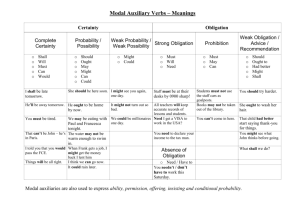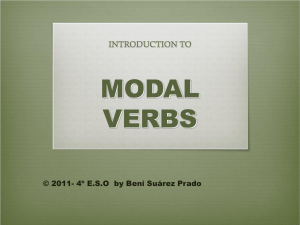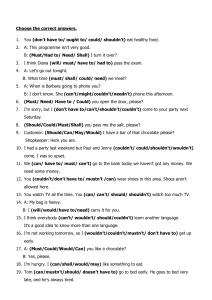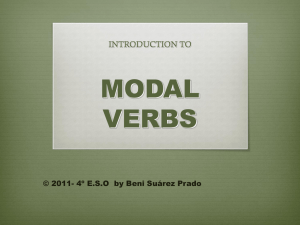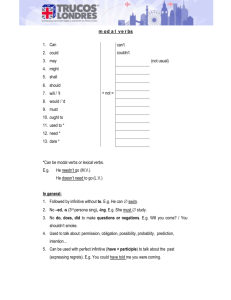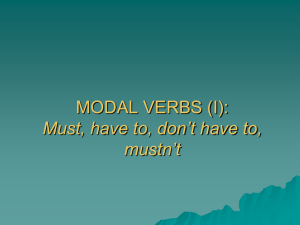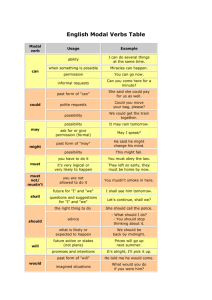MODALS A modal verb is a type of auxiliary verb that is used to
advertisement
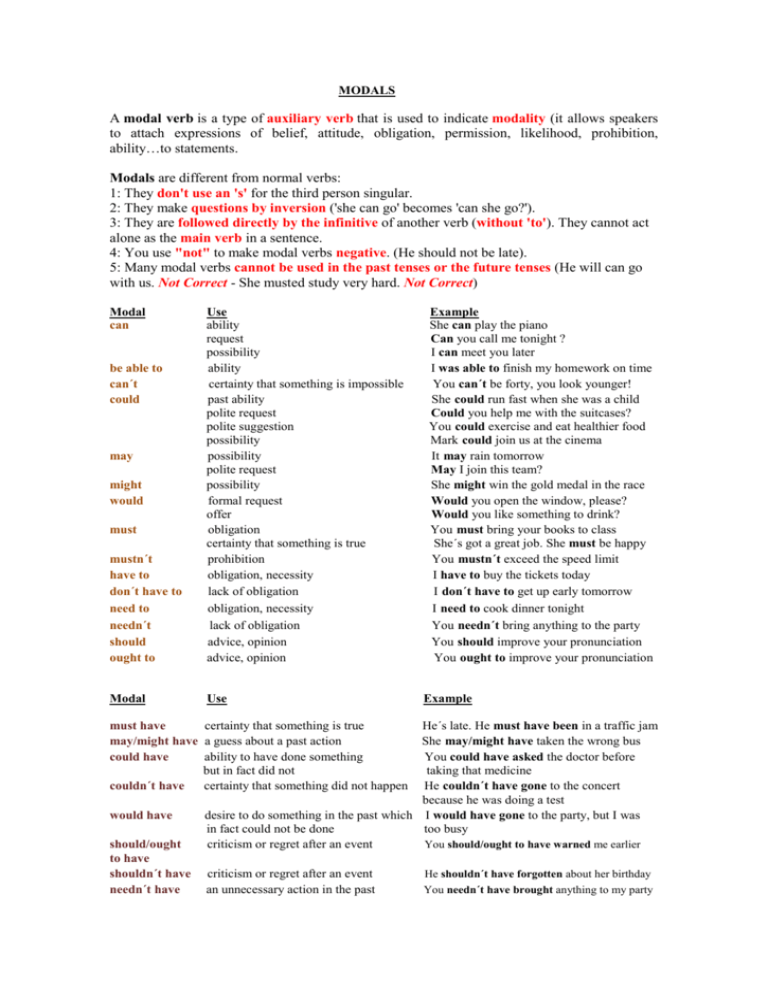
MODALS
A modal verb is a type of auxiliary verb that is used to indicate modality (it allows speakers
to attach expressions of belief, attitude, obligation, permission, likelihood, prohibition,
ability…to statements.
Modals are different from normal verbs:
1: They don't use an 's' for the third person singular.
2: They make questions by inversion ('she can go' becomes 'can she go?').
3: They are followed directly by the infinitive of another verb (without 'to'). They cannot act
alone as the main verb in a sentence.
4: You use "not" to make modal verbs negative. (He should not be late).
5: Many modal verbs cannot be used in the past tenses or the future tenses (He will can go
with us. Not Correct - She musted study very hard. Not Correct)
Modal
can
mustn´t
have to
don´t have to
need to
needn´t
should
ought to
Use
ability
request
possibility
ability
certainty that something is impossible
past ability
polite request
polite suggestion
possibility
possibility
polite request
possibility
formal request
offer
obligation
certainty that something is true
prohibition
obligation, necessity
lack of obligation
obligation, necessity
lack of obligation
advice, opinion
advice, opinion
Modal
Use
be able to
can´t
could
may
might
would
must
Example
She can play the piano
Can you call me tonight ?
I can meet you later
I was able to finish my homework on time
You can´t be forty, you look younger!
She could run fast when she was a child
Could you help me with the suitcases?
You could exercise and eat healthier food
Mark could join us at the cinema
It may rain tomorrow
May I join this team?
She might win the gold medal in the race
Would you open the window, please?
Would you like something to drink?
You must bring your books to class
She´s got a great job. She must be happy
You mustn´t exceed the speed limit
I have to buy the tickets today
I don´t have to get up early tomorrow
I need to cook dinner tonight
You needn´t bring anything to the party
You should improve your pronunciation
You ought to improve your pronunciation
Example
must have
certainty that something is true
may/might have a guess about a past action
could have
ability to have done something
but in fact did not
couldn´t have
certainty that something did not happen
would have
should/ought
to have
shouldn´t have
needn´t have
He´s late. He must have been in a traffic jam
She may/might have taken the wrong bus
You could have asked the doctor before
taking that medicine
He couldn´t have gone to the concert
because he was doing a test
desire to do something in the past which I would have gone to the party, but I was
in fact could not be done
too busy
criticism or regret after an event
You should/ought to have warned me earlier
criticism or regret after an event
an unnecessary action in the past
He shouldn´t have forgotten about her birthday
You needn´t have brought anything to my party
1- Complete the sentences with the modals below.
shouldn’t ■ mustn’t ■ might ■ ought to ■ must ■ could ■ can’t ■ have to
1.
2.
3.
4.
5.
6.
7.
8.
That ............can´t / shouldn´t.……… be Mary. She’s away on holiday. But that girl really resembles her.
Remember – you ..............can´t / mustn´t........…… use your mobile phone on the plane. It’s not allowed.
...........Could / Might.........…… I have a glass of water, please?
In my opinion, she .............ought to / have to.....……… leave her job. She hates it.
We ........... mustn´t / shouldn´t.......……… give the dog so much food. I think he’s getting a bit fat.
They ..........must / might.......…………share a flat again next year but they’re still not certain.
She was glad that she didn’t ................have to / could.......…… do all the work on her own.
You ...........must / ought to………… be so hungry! Otherwise, you wouldn’t be eating these disgusting chips!
2- Choose the correct answer.
1.
2.
3.
4.
You broke my necklace! You ………..… been more careful!
a. should have
b. must have
It’s beautiful. You ………………. given me a nicer present.
a. wouldn’t have
b. couldn’t have
I think James ………………… got lost. He’s never late.
a. might have
b. should have
I …………………… bought milk, but I didn’t know we needed more.
a. may have
b. would have
3- Complete the sentences with the modal perfects below and the correct form of the verb in brackets.
should have ■ couldn’t have ■ must not have ■ would have ■ could have
must have ■ might have ■ shouldn’t have
1.
2.
3.
4.
5.
6.
7.
8.
I’m not sure where Don went. He .....might have gone / should have gone.… (go) to buy bread.
I’m sorry I’m so late. You.........would have thought / must have thought…… (think) I wasn’t coming.
You ..should have brought / could have brought. (bring) the new world music CD. I wanted to listen to it while we studied.
She .......might have bought / would have bought.....…… (buy) three T-shirts, but she only had enough money for one.
I really upset Shari. I ......couldn´t have told / shouldn´t have told…… (tell) her the terrible news about Jim.
They decided to stay at a hotel, although they ..........could have stayed / must have stayed .… (stay) at our house. We
insisted that they were welcome.
That cake was incredibly delicious. It ..........couldn´t have been / must not have been......……… (be) better.
My swimming costume’s not in the suitcase. I ....... shouldn´t have packed / must not have packed.......…… (pack) it.
4- Which modals refer to the uses below?
ability
obligation
polite request
prohibition
certainty that something is true
certainty that something is impossible
possibility
lack of obligation
advice
offer
1- Would you like something to drink? → possiblility / ablility / offer
2- You can´t be serious. I don´t believe you.→ certainty that something is impossible / advice / prohibition
3- Could I play in your team? → offer / polite request /obligation
4- Men´s and women´s football must be separate.→ obligation
5- You should drink water during training.→ advice / prohibition / offer
6- Women don´t have to accept discrimination.→ lack of obligation / certainty that something is true / obligation
7- She´s got a great job. She must be very happy.→ certainty that something is true / offer / prohibition
8- My sister can play football as well as any man.→ possibility / advice / ability
9- They mustn´t pay women less than men.→ prohibition / obligation / polite request
10- She might get hurt playing football with men. → ability /possibility / obligation
5- Rewrite the sentences with the modals below. Do not change the meaning of the original sentence.
mustn’t ■ can’t ■ must ■ have to ■ can ■ should ■ might
1.
2.
3.
4.
5.
Are the students required to wear uniforms?
6- We´re not allowed to practise basketball on this court after 11.00 pm.
I recommend that you stop smoking.
7- I´m sure that Linda is happy about going to Greece.
It’s possible that it will rain this weekend.
Do you know how to play tennis?
I’m sure he’s not over 30. He looks very young.
6- COMPLETE THE SENTENCES WITH SUITABLE MODALS
CAN – CAN´T – COULD – COULDN´T – SHOULD – SHOULDN´T – MUST – MUSTN´T – HAVE TO – DON´T HAVE TO –
MAY – MIGHT
1- My son ……should / could……….. be home by now. Where can he be?
2- I think your thumb is broken. You ..don´t have to / should.. go to the emergency room.
3- We ……may / couldn´t………… visit him next week. We´re free!
4- You ……can´t / mustn´t……..drink beer! You´re not 18 yet.
5- …Can / May… I open the window, Mrs Johnson?
6- You …could / have to…. like to visit El Prado while you´re in Madrid.
7- I …have to /can…..go shopping. There´s no food in the fridge.
8- The Prime Minister .…doesn´t have to / has to….. resign. He has no options.
9- People …shouldn´t / mustn´t….. smoke in non-smoking areas.
10- You really …shouldn´t / can´t…. bite your nails. It´s a disgusting habit.
11- I ..…might / should…… have a party on Friday.
12- You …have to / don´t have to……. wash the car. I´ll do it.
13- It …may / must….. snow today. It´s freezing!
14- Children …must / can´t…. be accompanied by an adult at the zoo.
15- …Might / May…. I speak to the Chief of Police, please?
16- You .…mustn´t / shouldn´t… talk during tests. It´s forbidden.
17- She …can / could…. climb trees when she was three.
18- I crashed into a wall, but luckily I …could / might…. force the car door and escape.
19- We …can´t /couldn´t.. come to the party yesterday because our car had broken down.
20- I …can´t / don´t have to….find my CD player anywhere.
21- I ……can´t / couldn´t……swim now, but next year I´ll be able to swim.
22- …Could / Can…. you wait here, please?
23- We .…may / can´t….see you tomorrow because we´re going away.
24- They.…might / don´t have to…..win the match but it´s quite difficult.
25- The car looked like it…could / can…explode at any time.
26- You ….can´t / don´t have to….eat all the soup if you don´t want to.
27- He ….has to / doesn´t have to.…come so early. The teacher is ill.
28- Why are you home so early? You……should / could….be at work now.
29- ….Can / Can´t…I use your pen, Mary?
30- You……can´t / shouldn´t….take so many aspirins. It´s dangerous.
31- You…should / don´t have to….wear your coat today. It´s really cold!
32- It…must / might...not rain again this winter.
33- He…can / couldn´t….speak three languages.
34- People…should / can…check their tyres frequently.
35- Workers in this factory…can / have to…wear hard hats. They know it.

